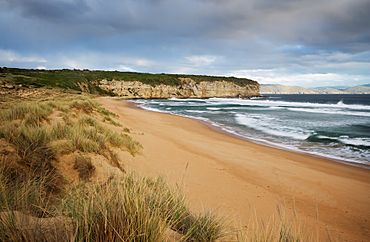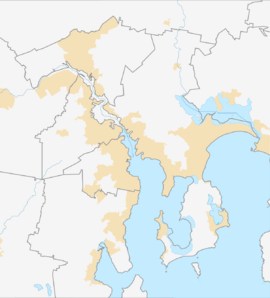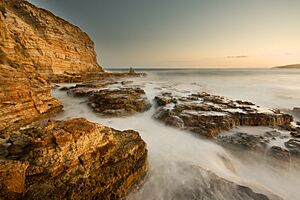Clifton Beach, Tasmania facts for kids
Quick facts for kids Clifton BeachHobart, Tasmania |
|||||||||||||||
|---|---|---|---|---|---|---|---|---|---|---|---|---|---|---|---|

A view looking towards the eastern end of the beach.
|
|||||||||||||||
| Population | 555 (2011 census) | ||||||||||||||
| Postcode(s) | 7020 | ||||||||||||||
| Location |
|
||||||||||||||
| LGA(s) | City of Clarence | ||||||||||||||
| State electorate(s) | Franklin | ||||||||||||||
| Federal Division(s) | Franklin | ||||||||||||||
|
|||||||||||||||
Clifton Beach is a cool coastal suburb. It's about 25 kilometers (15 miles) southeast of Hobart. You can find it on the South Arm Peninsula in Tasmania, Australia. This area is part of the City of Clarence. It's super popular for surfing!
Contents
About Clifton Beach
Clifton Beach is a well-known spot. It's famous for its waves. Many people come here to surf. The beach is about 2.1 kilometers (1.3 miles) long. It faces south-southeast. This means it gets lots of waves from Storm Bay.
The beach has a moderately steep front. There's a continuous sandbar. This bar can be cut by strong currents called rips. These rips can appear every 200 meters. They are especially strong after big waves. There are also permanent rips near the rocks at each end of the beach.
Beach Surroundings
The entire beach is backed by a coastal reserve. This area includes sand dunes. These dunes are now covered with plants. They can rise over 20 meters (65 feet) high. Behind the dunes is the shallow Pipe Clay Lagoon.
To the east, the beach is bordered by Cape Deslacs. This cape is 54 meters (177 feet) high. To the west, there are rocky cliffs. These cliffs are 50 meters (164 feet) high. They stretch south for about 3.5 kilometers (2.2 miles). They reach 100 meters (328 feet) high at Cape Contrariety.
Surfing and Safety
Clifton Beach is a favorite place for surfers. The waves here are often perfect for riding. However, these waves can also be very powerful. This makes the beach challenging. It's important to always be careful when swimming or surfing.
The waves here usually average 1 to 1.5 meters (3 to 5 feet) high. Because of the strong waves and rips, it's important to know your limits. Always swim or surf near others. It's also a good idea to check local conditions.
Clifton Beach Surf Life Saving Club
The Clifton Beach Surf Life Saving Club helps keep people safe. It was started in 1963. This club is part of a bigger organization. The other part is at Kingston Beach. Surf Life Savers are trained volunteers. They watch over the beach. They help swimmers and surfers stay safe. They also teach about beach safety.
 | DeHart Hubbard |
 | Wilma Rudolph |
 | Jesse Owens |
 | Jackie Joyner-Kersee |
 | Major Taylor |



